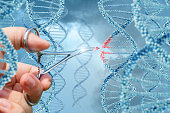In China, a team of scientists carried out “chemical surgery” on human embryos to “correct an error” in their genetic code. They used “basic editing” for this, i.e. the corrected DNA[1]. The human embryos used were carrying beta-thalassaemia – a hereditary disease caused by a change in a single base in the genetic code, i.e. an “isolated mutation“. These embryos were created by cloning and were destroyed after the experiment.
The team led by Junjiu Huang is delighted to be the first to “highlight the feasibility of curing genetic diseases in human embryos by basic editing”. This is a technique derived from “gene editing” with CRISPR, which would be “more precise“.
The same team at Sun Yat-Sen University in Guangzhou used CRISPR on human embryos for the first time in 2015, triggering numerous reactions in the scientific world (see China: Genetic handling of human embryos proven. Genetic handling of embryo – a worrying transgression).
Professor Lovell-Badge from the Francis Crick Institute in London, where this type of research is authorised (see United Kingdom: genetically modified human embryos), considers the study, which was published in the Protein and Cell Journal, to be “ingenious“, but questions the lack of pre-clinical studies on animals by the Chinese team.
Note from Gènéthique: CRISPR-cas 9 – from a simple bacterial system to complex ethical issues
[1] DNA comprises a combination of four “bases”, namely adenine, cytosine, guanine and thymine.
BBC, James Gallagher (28/09/2017)

